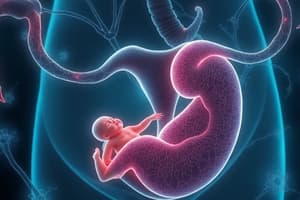Podcast
Questions and Answers
What physiological mechanism primarily initiates parturition?
What physiological mechanism primarily initiates parturition?
- Release of prostaglandins from the uterus
- Oxytocin from the maternal pituitary (correct)
- Cervical dilation signals from the fetus
- Foetal ejection reflex from the placenta (correct)
What is the role of oxytocin during the process of parturition?
What is the role of oxytocin during the process of parturition?
- To neutralize the effects of pregnancy hormones
- To decrease uterine contractions progressively
- To stimulate fetal growth and development
- To promote stronger uterine contractions (correct)
What is colostrum, and why is it important for newborns?
What is colostrum, and why is it important for newborns?
- The first milk produced containing essential antibodies (correct)
- A hormone that stimulates fetal growth during pregnancy
- Regular milk produced after six months of breastfeeding
- A type of food supplement rich in carbohydrates for infants
What triggers the further secretion of oxytocin during childbirth?
What triggers the further secretion of oxytocin during childbirth?
What is the average gestation period for humans?
What is the average gestation period for humans?
Study Notes
Parturition
- Human pregnancy lasts approximately 9 months, referred to as the gestation period.
- Parturition is the process of childbirth, triggered by intense uterine contractions at the end of pregnancy.
- The process is governed by a complex neuroendocrine mechanism involving signals from the fully developed fetus and the placenta.
- The fetal ejection reflex arises from these signals, causing mild uterine contractions.
- Oxytocin is released from the maternal pituitary gland as a response to these contractions.
- Oxytocin enhances the strength of uterine contractions, creating a positive feedback loop that leads to increased secretion of oxytocin.
- This cycle of contractions and hormone secretion results in progressively stronger contractions, culminating in the expulsion of the baby through the birth canal.
- After childbirth, the placenta is expelled from the uterus.
Lactation
- Mammary glands undergo differentiation during pregnancy to prepare for milk production.
- Lactation begins towards the end of pregnancy, enabling mothers to feed their newborns.
- The first milk produced is known as colostrum, rich in antibodies essential for newborn immune development.
- Breastfeeding in the first days of life is highly recommended by medical professionals to promote healthy growth and resistance in infants.
Studying That Suits You
Use AI to generate personalized quizzes and flashcards to suit your learning preferences.
Description
Explore the intricate processes of parturition and lactation in this quiz. Understand how hormonal signals and fetal development influence childbirth and the subsequent feeding of the newborn. Test your knowledge on the mechanisms that drive these vital biological functions.




